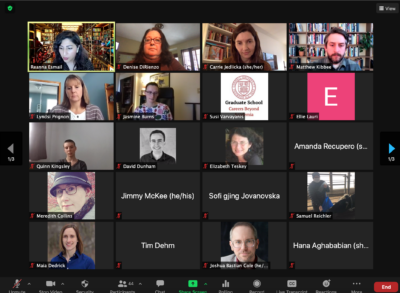So You Want To Work At The Library Recap

Panelists discuss careers in Librarianship
Jasmine Burns, visual resources metadata librarian at Cornell University Library; Carrie Jedlicka, clinical medical librarian at the Samuel J. Wood Library and C.V. Starr Biomedical Information Center at Weill Cornell Medicine; Matthew Kibbee, reference and information assistant at Mann Library at Cornell University; and Lyndsi Prignon, director of human resources for Cornell University Library and Cornell University Press shared tips on the broad range of jobs in libraries and tips on transferrable skills.
- Transferrable skills are key: interpersonal skills, organizational skills, demonstrated evidence of collaboration, written communication skills, and masters/PhD. Your degree does not have to be in library science. Subject matter expertise in other research areas welcomed.
- Research skills and knowing how to function in a library can give you an advantage as a candidate. Your degree gives you an introduction to research design, particularly knowledge in how to conduct literature searches and use databases.
- Customer service and experience interacting with community members is where some panelists had a learning curve. Think about volunteer or other job experiences where you can build those skills.
- Professional organizations are useful for those pursuing a career in libraries. These organizations may help you learn the lingo, explore job openings and network with others in the field. Professional Organizations include: Medical Library Association, American Library Association, New York Library Association, Empire State Library Association, South Central Regional Library Association,
- Steps to transition to library positions include gaining as much experience as possible, reaching out to the library liaison in your field to start a conversation, attend panels such as today’s, intern, or volunteer at a library or adjacent position.


